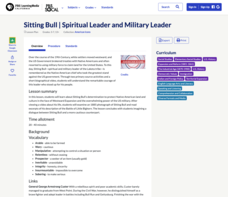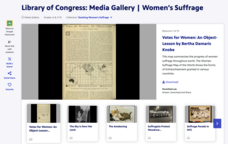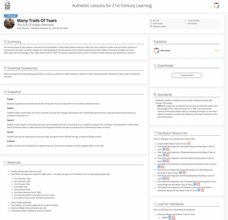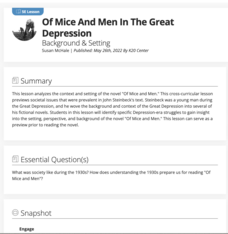Curated OER
Volcanoes: Kindergarten Lesson Plans and Activities
In the pre-lab, kindergarteners mimic the movements of the eruption of a volcano and discover various volcanoes around the United States. Then, pupils sort different types of volcanic rocks in the lab before learning how volcanoes grow...
PBS
Sitting Bull: Spiritual Leader and Military Leader
Sitting Bull was not expected to be a great warrior. Yet, he led the Lakota people and other tribes to several pivotal victories against the United States government when federal troops threatened their land. Using primary sources, such...
Constitutional Rights Foundation
Why Don’t More People in the U.S. Vote?
To vote or not to vote, that is the question. Secondary scholars explore voter turnout in the United States. The resource uses informational text, group discussion, and a worksheet to help academics understand hindrances to voting and...
PBS
Library of Congress: Media Gallery | Women's Suffrage
Designed to support a study of women's suffrage in the United States, a primary source document set from the Library of Congress includes images, song sheets, articles, statistical documents, political cartoon, and audio recordings...
National Woman's History Museum
Creating a Historical Thesis Statement
A strong thesis statement not only identifies the subject of an essay but also presents a claim that must be supported with evidence. After researching how nursing has evolved in the United States since the Colonial era, young writers...
Smithsonian Institution
The Suffragist: Educator's Guide for Classroom Video
Class members take on the role of historical investigators to determine why it took 40 years for women in the United States to get the right to vote. Sleuths view videos and analyze primary sources and images to gather evidence to answer...
Penguin Books
Teacher's Guide: When the Emperor Was Divine by Julie Otsuka
Julie Otsuka's haunting novel, When the Emperor Was Devine, is the subject of a 14-page teacher's guide. The guide includes the text of an interview with Otsuka, background information about Japanese immigration to the United States, and...
K20 LEARN
Many Trails of Tears: The Era of Indian Removal
Cherokee, Chickasaw, Choctaw, Creek, and Seminole. All were forced off their ancestral lands in the southeastern United States as part of the Indian Removal Act of 1830. Young historians research the tribes' reactions to this removal and...
K20 LEARN
Whose Manifest Destiny? Westward Expansion
Your land is my land! Young historians investigate the concept of Manifest Destiny used by the United States government to justify western expansion. Jigsaw groups read primary source documents to gain an understanding of the movement...
Curated OER
Introduction to Abigail Adams
Remember this lady! Abigail Adams, the wife of John Adams, the second President of the United States, and the mother of the sixth president, John Quincy Adams, was much more than a wife and mother. This prolific letter writer is the...
Benjamin Franklin Tercentenary
Benjamin Franklin: Master Diplomat for One Last Time
At 81, Benjamin Franklin was the oldest delegate to the 1787 Constitutional Convention, where he exercised significant influence in shaping key elements of how the United States operates. The class examines his role, using “The Scene at...
Curated OER
Tracing Our Own Family Pilgrimages
The Pilgrims may have arrived in North America by way of the Mayflower, but chances are, your class members' ancestors came to the United States in another way. Guide them through an exploration of their own heritage, countries of...
Smithsonian Institution
We Have a Story to Tell: Native Peoples of the Chesapeake Region
How did colonial settlement and the establishment of the United States affect Native Americans in the Chesapeake region? Your young historians will analyze contemporary and historical maps, read informational texts, and work in groups to...
K12 Reader
Abigail Adams: Persuading Her Husband
After reading a brief excerpt from a letter written by Abigail Adams to her husband and future president of the United States, John Adams, your young historians will practice their reading comprehension skills and identify what Abigail...
Mr. Roughton
Roman Empire
Does the United States parallel the Roman Empire in any way? Young historians work with four documents in order to answer this query as part of a structured DBQ assignment.
Stanford University
Annexation of Hawaii
Once an independent nation, Hawaii became part of the United States only after a business-sponsored coup of its queen. After examining newspapers from the 1890s, learners consider whether native Hawaiians wished to become Americans at...
Constitutional Rights Foundation
Winner-Take-All: The Two-Party System
Two's company, three's a crowd. High school historians learn about the Electoral College, a two-party, winner-take-all voting system in the United States. The instructional activity explains the pros and cons of the two-party system,...
Teaching Tolerance
Slavery as a Form of Racialized Social Control
An engaging lesson delves into the effects of slavery on society. Young historians read text excerpts, complete handouts, and participate in group discussion to understand how slavery was a means to control society and establish a racial...
Teaching Tolerance
Jim Crow as a Form of Racialized Social Control
Just because slavery was illegal doesn't mean it went away ... Jim Crow Laws took its place. An eye-opening lesson focuses on how Jim Crow Laws were used as a form of racial social control against African Americans in the United States....
DocsTeach
Analyzing a Map of the Louisiana Purchase
With the stroke of a pen, Thomas Jefferson roughly doubled the size of the United States. The Louisiana Purchase not only grew the new country, but also it gave rise to the legends surrounding westward expansion and accelerated the...
C-SPAN
Landmark Supreme Court Case: Roe v Wade
Perhaps no issue is as controversial than abortion in the American landscape. Go beyond the rhetoric by examining the Supreme Court case that legalized abortion in the United States. A guided note-taking activity unpacks the arguments...
K20 LEARN
Manifest Destiny: U.S. Territorial Expansion
A close examination of John Gast's painting "American Progress" launches a study of the concept of Manifest Destiny used to justify United States' policy of westward expansion. Young historians read statements from persons with different...
Curated OER
Te Ata Fisher: The Award-Winning Chickasaw Storyteller
Storytelling is a time-honored way to keep a culture alive. Introduce middle schoolers to Te Ata Fisher, the famous Chickasaw storyteller who shared her stories, songs, and dances across the United States and Europe. Young historians...
K20 LEARN
Of Mice and Men in the Great Depression: Background and Setting
What were living conditions like in the United States during The Great Depression, and how do those conditions compare with today? That's the question young scholars consider as they prepare to read John Steinbeck's Of Mice and Men....
Other popular searches
- United States History 1920s
- United States History 1900's
- United States History 1700's
- United States History Essays
- Ap United States History
- Media United States History
- United States History K 2
- History of United States
- United States History Exam
- United States History Colonial
- United States History Units
- United States History Timeline

























